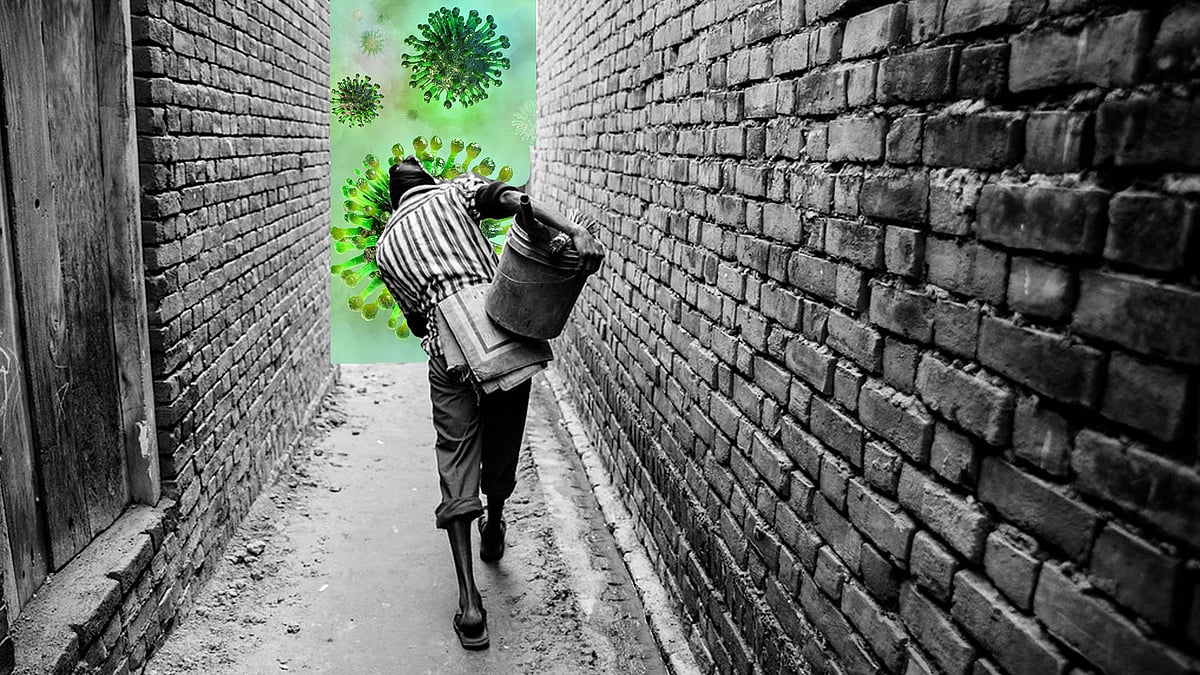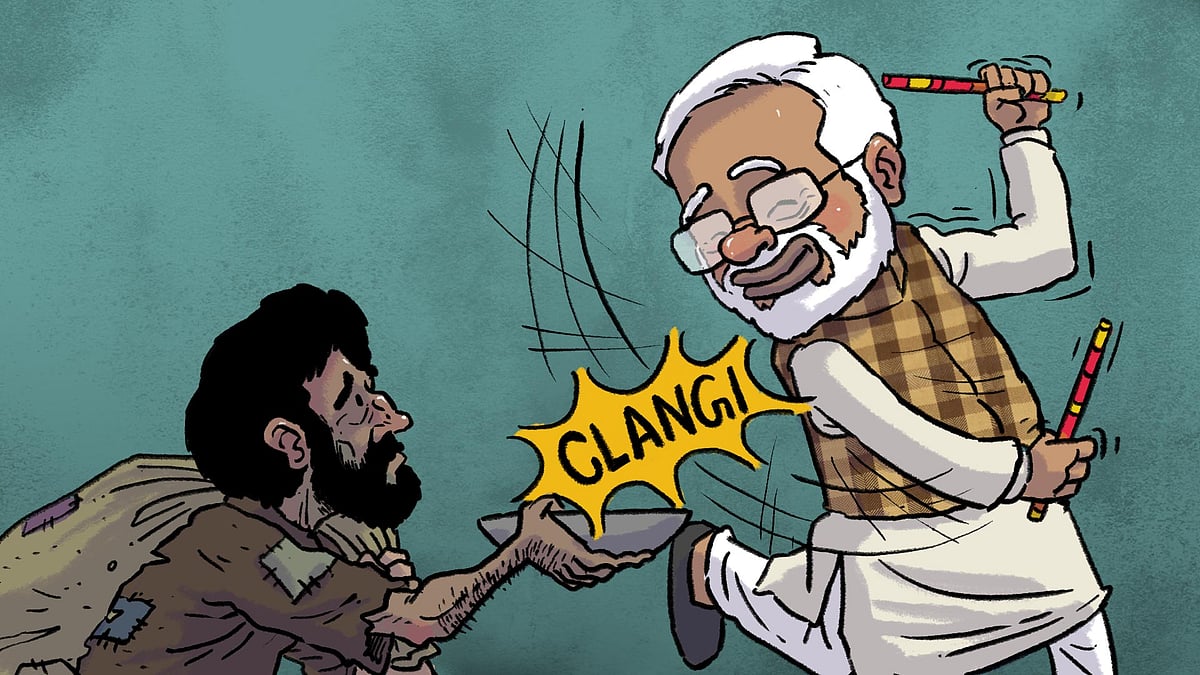Caste, bigotry, and the apathy of Modi’s theory of atmanirbharta
Promoting self-reliance in these times, when millions of Indians could be dying of hunger, is essentially upper caste vanity speaking through a vessel that is Modi.
Prime Minister Modi’s address last week followed the same trajectory as most of his speeches: invoking India’s pride of place in the world, the significance of the Hindu way of living in a global world, among other things. First half, till the 49 percent mark to be exact, of his speech dealt with topics like open defecation, the Kutch earthquake, and Y2K before he finally got to the crux of the matter: the new stimulus package.
And even then, he skipped specifics, keeping his speech open-ended.
The prime minister is clearly not a man of details. He’s a man of big ideas, broad brushstrokes, and even bigger headlines, he thrives in vague proclamations. Perhaps it’s in his vagueness that we can understand the man and his worldview, something that’s otherwise hard to pin down.
The most memorable aspect of the address obviously was “atmanirbharta”, or self-reliance, with an emphasis on buying local, expressed rather cheesily as “local pe vocal”. Atmanirbharta trended on Twitter for the next few days.
To be self-reliant the self should (a) either possess enough means to not need anything from others; or (b) decide to live within one’s own means. Does the nation state of India fulfill any of these conditions? Not at this point, certainly.
In fact, as we speak, US President Donald Trump has announced that the US will send ventilators to help India. Which is an otherwise welcome move, since India needs all the help it can get, but what about the state's atmanirbharta? And if the atmanirbharta mantra wasn’t intended for the state itself, then why was it said and for whom?
The answer, perhaps, lies in the speech itself, since Modi pinned it on “a combined resolve of 130 crore citizens for a self-reliant India”. Simply put, atmanirbharta is required of the people of the state, not the structures that administrate and run it.
Critics pointed out that the prime minister did not acknowledge the plight of migrant workers, who are now walking in droves from metropolitan “smart cities” to their hometowns. But the critics are wrong: Modi talked about them, just not to them. His pontification about self-reliance was directed at them, and in that address around atmanirbharta lies the whole worldview of our prime minister.
Understanding Modi’s worldview
First off, why atmanirbharta?
You need to understand the forces informing the prime minister’s worldview. As he said in Karmayogi, his only published book, about the Valmiki community, which has a long history of manual scavenging:
“I do not believe they have been doing this job just to sustain their livelihood. Had this been so, they would not have continued with this kind of job generation after generation. At some point of time somebody must have got the enlightenment that it is their duty to work for the happiness of the entire society and the Gods; that they have to do this job bestowed upon them by Gods; and this job should continue as internal spiritual activity for centuries.”
I would like to believe that when Modi said or wrote this, he intended no malice, because that would be giving him too much credit. Instead, this line of thinking is a direct reflection of the Hindu view of society. For example, in the Bhagavad Gita, Krishna tells Arjuna: “Karmanye vadhikaraste, maa faleshu kadachana”, meaning, “You have the right to work only, but never to its fruits. Let not the fruits be your motive.”
From this, it’s easy to assume — as the prime minister did — that even those lower in the caste hierarchy receive some kind of spiritual bliss while performing “caste duties”. Never mind that 110 people died while cleaning sewers in 2019.
Modi’s story is that of a boy who grew up with the Rashtriya Swayamsevak Sangh. His education was primarily through the Sangh too. By education, I don’t mean science and arts, but the moulding of how you look at the world. The Sangh is Modi’s true alma mater, and the Sangh itself has had a strange relationship with caste.
While it has repeatedly tried to make overtures to Dalits, it’s largely seen as a Brahimin, Baniya organisation. It looks at caste through two main lenses. On the one hand, it believes caste is not birth-based, but based on vocation, and got polluted over time. On the other, it also believes that Hinduism’s inherent varna system offers different varnas an equal platform on the spiritual stage and, therefore, has theological validity.
While the Sangh rightly seems to view caste as an evil of society, it is very reluctant to accept that evil as a historic reality of India’s glorious history, because that will malign the idea of that glory itself.
In We or Our Nationhood Defined, MS Golwalkar said it was “none of the so-called drawbacks of the Hindu social order which prevents us from regaining our ancient glory”. Deendayal Upadhyaya went a step further in Integral Humanism, considered the ideological charter of the Sangh.
Upadhyaya wrote: “In our concept of four castes, they are thought of as an analogous to the different limbs of Virat-Purusha […] These limbs are not only complementary to one another, but even further, there is individuality, unity. There is a complete identity of interest, identity of belonging. If this idea is not kept alive, the castes instead of being complementary can produce conflict. But then this is distortion.”
So, while the Sangh wants Hindu society to get together as one, it also does not want the historical reality and, frankly, injustices of castes to be questioned and examined.
Add to this the upper-caste origins of those in the Sangh leadership, and the lack of Sangh leaders with lived experiences of discrimination, and it makes it almost impossible for the organisation to understand caste. The RSS historically suffers from the same issue that most Indian institutions do: a lack of diversity in its leadership. This makes it, even in the best of circumstances, nothing more than a group of well-meaning upper-caste Hindus telling the traditionally marginalised that their trauma is disproportionately exaggerated and, in the worst case, worth it.
Golwalkar, whom Modi idolises, also proposed this slogan: “Sab jaati mahaan, sab jaati samaan”, or “all castes are great and all castes are equal”. This is another creed that the Sangh promises to live by. In this idealised slogan, Golwalkar does not depart from the primary Brahminical position that varnas (and castes) were parts of the same virat purush and hence equal, although they come from different parts of that virat body (a Shudra is born from its feet).
What the slogan truly means is that all castes should perform their assigned tasks as their dharmas. Valmikis should continue to do manual scavenging and demonstrate their spirituality through it.
And this is how the Sangh and her prodigal son, our current prime minister, looks at the world. It’s the view of the upper-caste (even though he himself has been a “bureaucratic” OBC since the mid-1990s). The ritualistic aspect of religion — like marriages, births, deaths, even house-warmings — require a pujari, or Brahmin, to anoint the event. And being a Brahmin is very much hereditary, much like being born a manual scavenger.
Caste and Hinduism are intertwined in such a way that to observe the articles of faith, you must accept caste. To be a virat Hindu, therefore, is to accept the hierarchy of caste and to rationalise it in your own little Karmayogi ways.
Atmanirbharta middle class
No nation has a monolithic identity, however much we want to treat it as “ek Bharat shreshth Bharat”. The truth is that those walking barefoot back to their homes cannot be asked to be self-reliant — it’s an assault on their dignity.
Of course, the people Modi talks to and for, can afford self-reliance, and even celebrate it. The idea of self-reliance in these times, when millions of Indians could be dying of hunger, is essentially upper-caste vanity speaking through a vessel, that is Modi.
It’s the same vanity that wants to build statues, and copy the West in thanking healthcare workers but without having the forethought for any concrete policy measures. Karnataka asking migrant workers to stay back is the same vanity on display. For them, everyone else exists solely to serve their needs.
This worldview attaches divinity to the work of manual scavenging while also considering them sub-human, as indicated by how migrant workers were sprayed with bleach and water in Bareilly.
The notion of self-reliance even in the West — across the spectrum, from Burke’s philosophy to Rand’s theory of objectivism — comes from people who look at society as a place where everyone starts as equal and then builds on it from there. This fuses well with the upper-caste Indian notion of meritocracy that ignores all the structural inequalities in society.
Much like the Sangh, for this group too, it’s difficult to look at society as an unjust place because that puts into question their own ancestral pride and lineage. This leads to the just-world hypothesis, which is the tendency to first assume that the world is fair and work backwards from there. Since being poor is clearly bad, therefore, poor people must be bad in some way or else the world wouldn't be fair.
The need to feel good about your identity and your place in the world is not inherently bad. Except, across the world, this need fuels conservative politics. Because if the world is just, and I deserve my current place in society, it must mean that social hierarchies need to be preserved. This is the primary reason for conservative politics to exist, to support a system already established.
So, conservatives (or the upper-caste and middle class) model welfare ideas as theft, since conservatives see welfare as taking from the “honest, hard-working middle class” to give to the “undeserving” poor — usually lower-castes and minorities. The poor is often synonymous with lazy, because in a world of meritocracy, you can only be poor if you’re lazy.
Since the world that they were born in, and where their forefathers died, was always a just world, to see flaws in its inherent egalitarianism is impossible. It therefore becomes even more important to preach atmanirbharta to those seen as an antithesis to the just world.
The apathy of atmanirbharta
There is an incentive for Modi, celebrities, and the media to do what they do. It’s simple demand and supply. Of course, an artificial demand can be created and amplified. But in the end, all these peoples are suppliers to our inherent societal bigotry. Society incentivises these people to act in the way they want, whether it’s in the form of TRPs or election victories.
As Dr Ambedkar said in A Reply to the Mahatma: “But nonetheless, anyone who relies on an attempt to turn the members of the caste Hindus into better men by improving their personal character is, in my judgment, wasting his energy and hugging an illusion.”
Perhaps he had the foresight and courage to understand and accept something that we do not have even now. That fighting bigotry means fighting caste which means fighting the belief system at the root itself. Everything else is just cosmetic.
 Coronavirus, social distancing, and the return of caste apologists
Coronavirus, social distancing, and the return of caste apologists Why India doesn’t seem to care about its poor even during a pandemic
Why India doesn’t seem to care about its poor even during a pandemic